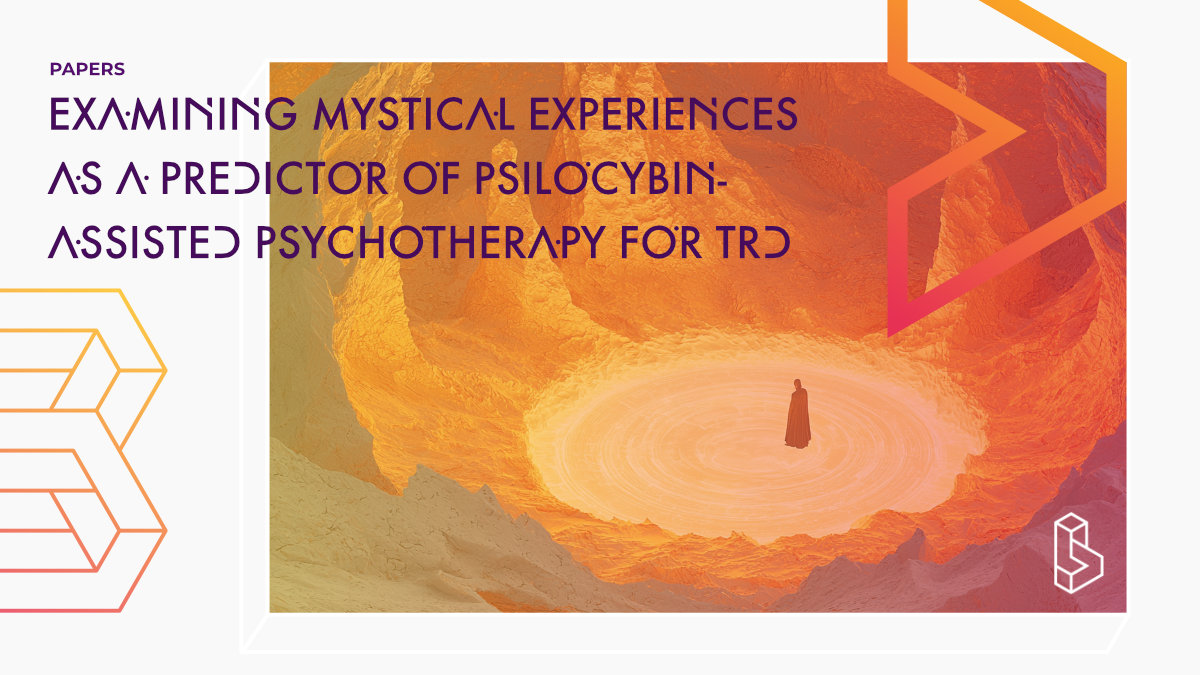This secondary analysis of treatment-resistant depression patients (n=31) with major depressive disorder or bipolar II disorder found that greater mystical experiences during the first 25mg psilocybin dose predicted better antidepressant outcomes, though this relationship was not observed for subsequent doses.
Abstract of Examining mystical experiences as a predictor of psilocybin-assisted psychotherapy for TRD
“Background: Psilocybin-assisted psychotherapy (PAP) is a promising treatment for various psychiatric disorders. However, the exact biological and psychological mechanisms of action of PAP remain to be determined. Examining predictors of PAP outcomes may help identify necessary processes for positive treatment outcomes. Mystical experiences are considered a key aspect of the subjective effects of ingesting psilocybin. Mystical experiences have been observed to be possibly predictive of positive outcomes in psilocybin treatments. Therefore, some argue that mystical-type experiences are necessary to achieve therapeutic benefits.
Aims: The current study examines mystical experiences as a predictor of antidepressant treatment outcomes in PAP, in a complex clinical sample.
Methods: Participants included 31 individuals with a primary diagnosis of major depressive disorder (MDD) or Bipolar II Disorder (BDII), with treatment resistance to symptoms of their disorder. Participants had one, two, or three PAP treatments with a fixed dose of 25 mg of psilocybin. Depressive symptoms were measured at baseline, at a pre-dose visit and at 2 weeks post-dosing. The presence of mystical experiences was measured on the dosing day after the acute effects had resolved.
Results: For the first psilocybin dose, participants with greater levels of mystical experiences exhibited a greater antidepressant effect from PAP. This effect was not found at the second or third doses.
Conclusion: These results provide preliminary support for the hypothesis that mystical experiences have therapeutic importance in PAP and extend the literature to include a clinical sample of individuals with treatment-resistant depression in the context of MDD or BDII.”
Authors: Ryan M. Brudner, Erica Kaczmarek, Marc G. Blainey, Christian Schulz-Quach, Shakila Meshkat, Zoe Doyle, Orly Lipsitz, Hilary Offman, Rickinder Sethi, Geneva Weiglein, Roger S. McIntyre & Joshua D. Rosenblat
Summary of Examining mystical experiences as a predictor of psilocybin-assisted psychotherapy for TRD
Psilocybin-assisted psychotherapy (PAP/PAT) has gained momentum as a novel approach for treatment-resistant depression (TRD). In PAP, individuals ingest a single 25 mg dose of psilocybin in a controlled setting, framed by preparatory and integration therapy sessions. Psilocybin is converted in the body to psilocin, which stimulates the 5-HT2A serotonin receptor and temporarily alters large-scale brain networks such as the default-mode network and the amygdala, regions linked to self-reflection and emotional processing. The subjective effects frequently include vivid perceptual changes, intense shifts in mood and a sense of self-transcendence. Earlier research has highlighted factors that appear to shape therapeutic response, ranging from symptom severity and personality to the quality of the acute psychedelic experience itself.
Among these subjective factors, mystical-type experiences—episodes characterised by a profound sense of unity, timelessness, sacredness and ineffability—have been repeatedly associated with better outcomes. However, evidence has been inconsistent, partly because prior studies have varied in sample size, diagnostic focus and measurement tools. Brudner and colleagues therefore set out to determine whether the intensity of mystical experiences, quantified by the 30-item Mystical Experience Questionnaire (MEQ-30), predicts short-term antidepressant effects in a clinical sample of TRD drawn from a wait-list-controlled feasibility trial.
Methods
Participants
Find this paper
https://doi.org/10.1177/02698811251346697
Open Access | Google Scholar | Backup | 🕊
Cite this paper (APA)
Brudner, R. M., Kaczmarek, E., Blainey, M. G., Schulz-Quach, C., Meshkat, S., Doyle, Z., ... & Rosenblat, J. D. (2024). Examining mystical experiences as a predictor of psilocybin-assisted psychotherapy for treatment-resistant depression. Journal of Psychopharmacology, 02698811251346697.
Study details
Compounds studied
Psilocybin
Topics studied
Depression
Bipolar Disorder
Study characteristics
Original Re-analysis
Participants
31
Humans
Compound Details
The psychedelics given at which dose and how many times
Psilocybin 25 mg | 3xLinked Research Papers
Notable research papers that build on or are influenced by this paper
Psilocybin-assisted psychotherapy for treatment resistant depression: A randomized clinical trial evaluating repeated doses of psilocybinThis open-label waitlist trial (n=30) assessed the feasibility of psilocybin-assisted psychotherapy (PAP/PAT) in a complex population with treatment-resistant depression (TRD), including major depressive and bipolar II disorders, baseline suicidality, and significant comorbidity. Participants received one, two, or three sessions of PAP with psilocybin (25mg), accompanied by preparation and integration psychotherapy sessions. Immediate treatment showed greater reductions in depression severity (MADRS) compared to the waitlist period, with a large effect size (g = 1.07, p < 0.01). Repeated doses were associated with further reductions in depression severity. Adverse events were transient, and the study demonstrated feasibility, preliminary antidepressant efficacy, safety, and tolerability in this population.
Linked Clinical Trial
Psilocybin for Treatment-Resistant DepressionThis interventional trial (n=40) aims to assess the efficacy of psilocybin (25mg) with psychological support on anhedonia in individuals with treatment-resistant major depressive disorder (MDD).

